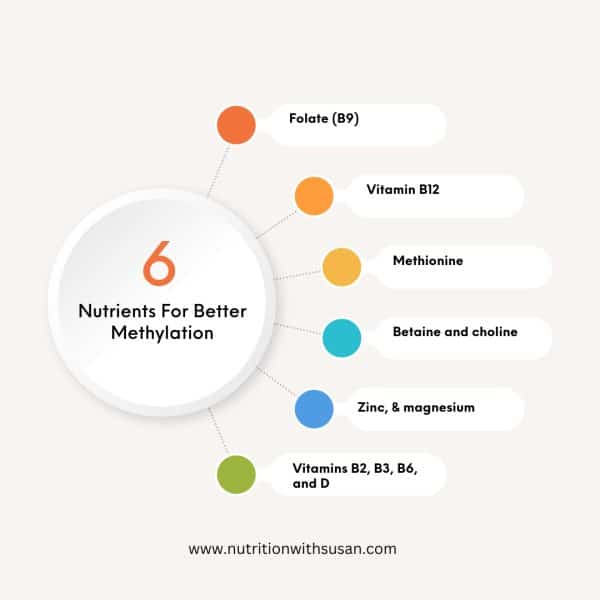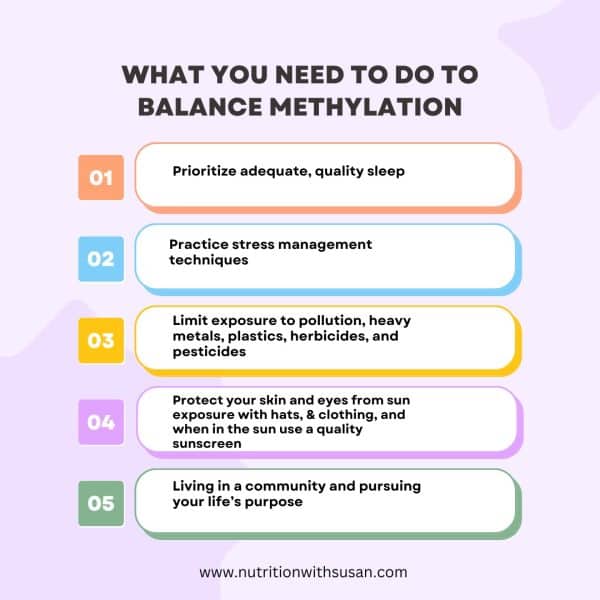Your body is amazing — ever wonder how it manages so many functions at once? Well, we have enzymes handling all the work but they need something called methyl groups to do their jobs effectively and get things done.
Maybe you’re wondering exactly what work they do. Here’s a summary of just a few things on their to-do list:
- Manage the energy that fuels our every action i.e. your metabolism
- Detox and help convert used hormones like estrogens into removable waste
- Produce the chemical messengers — neurotransmitters — that regulate mood, memory, digestion, and sleep
- Alert us that our alarm system is on and ready to fight things like inflammation
- Help us hyper-focus when performing an important task and then switch gears to rest and recovery mode — think stress response
- Guide the on and off switches in our genes (genetic expression) for vital functions, such as central nervous system development and tumor suppression
- Keep our DNA in tip-top shape through synthesis and repair mechanisms
And that’s not even everything these little guys do — I’m exhausted just thinking about it! Methylation happens in every one of our cells all the time. It occurs in our bodies billions of times per second! We even have a backup system; it’s that important.
In this post, you’ll learn what is methylation, how you can tell if you have an issue, and how to improve methylation and heal your body. Read on to get all the juicy tidbits on this super important hot topic.

What Is Methylation?
Methylation begins with a methyl group, which is a single carbon with three hydrogens attached. In biochemistry, these groups are small and stable and can be moved from one molecule to another. Methylation is this handoff, the process of transferring or “donating” a methyl group.
Another way to think about methylation is to imagine a relay race where runners take turns circling the track. Each runner carries a baton (the methyl group) as they run. And when it’s time to transition to the next runner, they pass the baton (methylation).
Many molecules can donate methyl groups, but one molecule called SAM-e (S-adenosylmethionine, pronounced “sammy”) stands above. SAM-e is often called the universal methyl donor, and hundreds of enzymes rely on it. We can think of SAM-e as a great relay teammate who can transfer methyl groups in the targeted ways we need for optimal health.
What Are The Symptoms of A Methylation Imbalance?
Since methylation impacts so many of the body’s functions, it needs to be optimal. And you need to know when it is anything less than optimal.
Unfortunately, it is not as easy as seeing a burn or noticing an irritation. Methylation is more abstract. At its core, this complex mechanism is all about balance, and the symptoms of unbalanced methylation vary widely. Some of the many possible symptoms include:
• Fatigue
• Insomnia
• Memory/brain fog
• Mood/depression
• Allergies
• Headaches
• Cancer
• Metabolic health issues (blood sugar)
What Causes Methylation Imbalances?
Without strategic support, sub-optimal methylation activity is all too common. Better nutrition and lifestyle choices deliver the body what it needs for optimal methylation. Thus, what challenges optimal methylation include factors that reduce intake of better nutrition or that increase the body’s workload.
• Sub-optimal digestion – optimal methylation requires nutrients, which is the role of digestion. When digestion (breaking down nutrients into usable forms, absorbing them, and having them get to their desired destination in a timely manner, efficiently and effectively removing waste) isn’t optimal, methylation won’t be either.
• Food processing – the B vitamins and minerals which play a critical role in producing SAM-e are particularly sensitive to processing. Most forms of manufacturer processing (not what you do in the kitchen) strip away many naturally present vitamins, minerals, and phytonutrients (including epinutrients involved in gene expression!). Typically, the more processed, the greater the loss.
• Food preparation – can also reduce the nutrient content of our food, much like commercial processing. Most nutrient losses are the result of water-leaching or applying excessive heat.
• Artificial and synthetic ingredients – are often added to our foods as preservatives, to achieve specific flavor or texture, and to replace the vitamins and minerals lost during processing. They’re also used in supplements.
For example, folic acid, the synthetic form of folate (B9) you will see on all products with enriched flour as well as many other packaged food and supplement ingredient lists. Folic acid doesn’t have the methyl groups found in folates from food.
As such, it must go through an extra 2-step process – additional work – that stresses our methylation systems. Some people can’t manage this efficiently, so excess folic acid may circulate in the bloodstream while the body is deprived of folate, thus struggling to make SAM-e.
• Soil health – plays a huge role too, and our food’s mineral, vitamin, and protein content has declined with the adoption of modern farming practices.
• Environmental exposures – from smoking, UV, and x-rays, blue light, pollutants, heavy metals, plastics, herbicides, and pesticides.
• Medications – can reduce absorption and availability of key nutrients involved in methylation. They also can impact digestive health, which as noted above means they will also impact available resources for methylation.
• Elevated and chronic stress – increase the production of stress hormones that then need to be methylated to be broken down.
How To Improve Methylation?
Make better choices. Sounds simple right? Better nutrition means giving your body what it needs to run better while avoiding ingredients that can irritate, overwhelm, or disrupt its functions.
And when it comes to methylation, our lifestyle choices play a significant role, too, as we aim to support our methylation pathways by limiting our chemical exposures, managing stress, and getting adequate sleep.
Better nutrition is built on four pillars: quantity, quality, balance, and frequency. Evaluate your choices and optimize to increase the nutrients delivered, in the amounts, forms, balance, and frequency that your body can use optimally. How do you do this?
• Upgrade synthetic and artificial choices to nutrient-rich ones.
• Avoid non-nutritive sweeteners which alter oral and gut microbiome (and can themselves be artificial ingredients)
• Personalize supplement recommendations to balance nutrient levels instead of contributing to imbalances
• Limit or remove alcohol

What Are The Nutrients For Better Methylation?
• Folate (B9) – The star of the show! Folate donates a methyl group to produce SAM-e. Good food sources include dark leafy greens, cruciferous vegetables, beans, legumes, nuts, and seeds.
• Vitamin B12 – Folate’s trusty sidekick! Red meat and seafood are the most concentrated sources, but all animal products provide some B12. For vegetarians and vegans, lean on high-quality supplements (and fortified foods) to meet your needs.
• Methionine – the backbone of SAM-e and an essential amino acid (a building block for proteins). Ensure adequate protein intake to support methylation.
• Back-door methyl donors – Because creating SAM-e is so critical, we have a secondary or “backdoor” route to support folate in donating methyl groups. Our bodies can create some of these backup methyl donors but not enough to meet our needs.
Betaine and choline are two such back-door methyl donors. Beets and broccoli are good sources for betaine, plus eggs, and edamame are great for choline to support this back-door system.
• Other helper methylation nutrients are zinc, magnesium, along with Vitamins B2, B3, B6, and D.

Lifestyle Factors
A healthy lifestyle makes a huge difference in balancing methylation. So what do you need to do?
• Prioritize adequate, quality sleep
• Practice stress management techniques
• Limit exposure to pollution, heavy metals, plastics, herbicides, and pesticides. Choose more organic foods, drink filtered water, use glass or ceramic food containers, and upgrade your personal care products.
• Protect your skin and eyes from sun exposure with hats, and clothing, and when in the sun (even cloudy days) use a quality sunscreen
• Living in a community and pursuing your life’s purpose
Why Can’t I Just Take A Supplement?
Can’t we simply supplement with better forms of B vitamins and even SAM-e to tackle these challenges? Methyl supplements can play a role in our journey to better nutrition.
If we upgrade a folic acid or cyanocobalamin to methyl forms this may have a positive impact. However, you still want to optimize methylation with other better nutrition and lifestyle choices. For example, your supplement may not be the only or top source(s) of folic acid in your diet.
Conclusion
We’ve uncovered the essence of methylation, explored the symptoms of methylation imbalances, and shed light on the underlying causes that disrupt this delicate process.
We’ve also delved into practical steps to improve methylation and set our bodies on a path to healing and vitality. Remember, it’s not a one-size-fits-all solution, but rather a personalized approach that takes into account our unique needs and circumstances.
Nourish your body with the right nutrients, prioritize a healthy lifestyle, and seek support from healthcare professionals — like your friendly neighborhood dietitian — who can guide you on this path. And above all, listen to your body’s whispers, for it holds the wisdom to guide you toward balance and well-being.
If you’d like your very own personal guide on your healthcare journey, I’d be honored to work with you in developing a nutrition plan to get you on the road to better health. You can check out my Signature Coaching Program and schedule a complimentary call here. Wishing you abundant health and profound healing on your methylation journey!
***Disclaimer: This post is for informational purposes only and should not be construed as medical advice***


